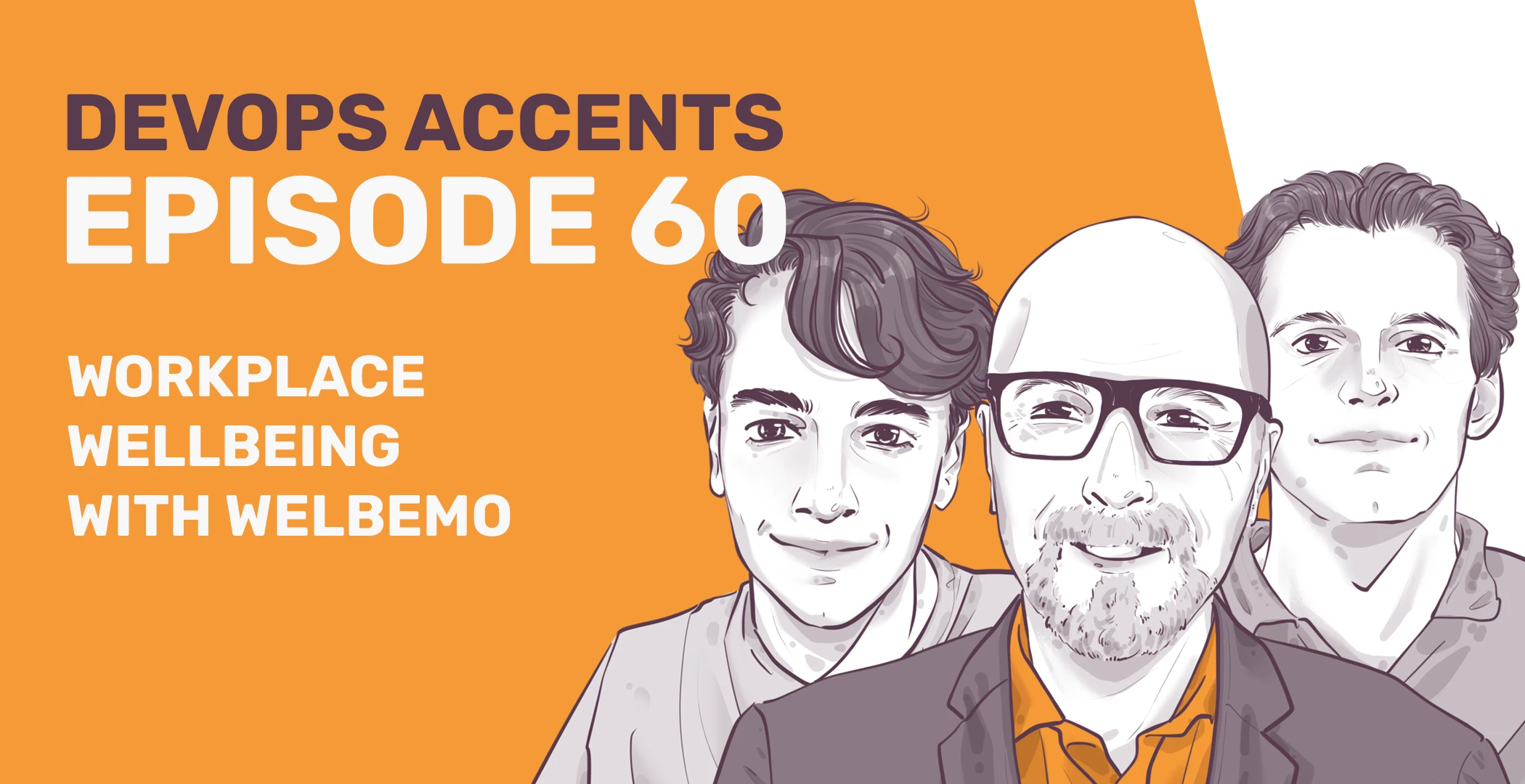Workplace Wellbeing with Welbemo | DA #60


Should we pay more attention to our workplace mental health? For episode 60 of DevOps Accents, our guests are Samuele Monasterolo, Lorenzo Grassi and Fabio Ciravegna from Welbemo, an Italian startup for workplace wellbeing assessment. In this episode:
- The beginnings of Welbemo;
- The startup environment in Italy;
- Mental health and wellbeing in the tech industry;
- How can you measure burnout and anxiety?
- Protecting personal employee data from the employer;
- The use of AI and data security in Welbemo.
You can listen to episode 60 of DevOps Accents on Spotify, or right now:
In the evolving world of tech startups, three minds—Fabio Ciravegna, Lorenzo Grassi, and Samuele Monastirolo—have come together to tackle one of the industry’s most overlooked yet pressing issues: employee mental health. Their venture, born in Turin and developed within the academic setting of the University of Turin, reflects a unique blend of technological acumen, scientific rigor, and a drive to make workplaces genuinely healthier.
A Startup Culture Growing Against the Grain
The perception that Italy is a difficult place to launch startups is challenged directly by Fabio Ciravegna, a professor and experienced entrepreneur. “That's really a misconception,” he said. “You are much more supported in creating a startup in Italy than… in the UK that is not in London.” With incubators, government funds, and legal aid readily available, especially in places like Turin and Milan, Fabio argues that Italy is a surprisingly nurturing environment for early-stage founders.
Samuele and Lorenzo echoed this sentiment, pointing to the support they received from university-based programs and legal experts, particularly around managing sensitive data—a cornerstone of their platform. As Lorenzo explained, “Our main part is data, sensitive data. So the lawyers were very important because they told us how to manage the data and how to secure the application.”
When Mental Health Meets Metrics
The core of their work revolves around enabling companies to understand the emotional and psychological well-being of their teams. But rather than relying on generic or superficial indicators, they’ve built their solution around scientifically validated questionnaires. Fabio emphasized this distinction: “These are written by doctors and psychologists… scientifically evaluated… so that you cannot trick them.”
Lorenzo added that they look beyond burnout alone. “We measure a lot of dimensions such as anxiety and work-life balance… And we give the company consultancy with our psychologist so they can interpret the data better.” The platform doesn't just highlight problems—it helps companies identify correlations, such as whether low work-life balance contributes to anxiety in specific departments.
Empowering Individuals Without Exposing Them
The team is keenly aware of the privacy concerns that come with mental health data. Samuele explained their approach: “We store their information on our server… and also, as Fabio said, the artificial intelligence runs locally.” Importantly, individual data is anonymized and decoupled from personal identifiers. As Fabio put it, “What the HR department sees is an aggregate number… There is no possibility to understand who the different people are.”
This strict adherence to data protection principles—including GDPR compliance and privacy-by-design architecture—is foundational to building trust in their tool. Fabio added a broader philosophical perspective: “If your main asset is your brain, why aren’t we maintaining it like we maintain trucks in a transport company?”
From Self-Awareness to Action
For the employees, the benefits go beyond passive observation. Samuele uses the platform himself, regularly tracking his anxiety and logging personal events in a digital diary. This creates opportunities for meaningful reflection and potential correlations between daily life and emotional well-being. “The idea is to use that data and correlate it with the quizzes… and give you insight for your daily life,” he said.
The system also offers AI-driven suggestions—though with very defined boundaries. “It’s mostly for the person to reason on the results of the questionnaires,” said Fabio, clarifying that the AI doesn't overstep into diagnosis or unprompted recommendations.
Shared Responsibility for Healthier Teams
While the individual insights are valuable, the responsibility doesn't fall solely on the employee. Employers are encouraged to test and adapt interventions based on trends in the data—like forming sports groups to boost physical activity or improving communication in high-anxiety departments. As Samuele explained, “A little better for each one of the people, it’s a lot for the company.”
And it’s not about prescribing cookie-cutter solutions. “We can tell the employers, look, we think that help from this kind of person would help you,” Fabio said. The platform is designed to plug into an ecosystem of specialists, legal frameworks, and cultural sensitivities, creating a holistic approach to workplace well-being.
In their thoughtful blend of science, ethics, and design, Fabio, Lorenzo, and Samuele offer more than just another HR tool. They are proposing a mindset shift—one where psychological health is recognized, respected, and proactively supported, not just by individuals, but by the companies they help build.
Show Notes
- Welbemo: https://www.welbemo.com/
- Fabio Ciravegna, professor from the University of Torino, Co-founder and CIO at Welbemo, on LinkedIn
- Lorenzo Grassi , Co-founder and CDO at Welbemo, on LinkedIn
- Samuele Monasterolo, Co-founder & CTO at Welbemo, on LinkedIn
Podcast editing: Mila Jones, milajonesproduction@gmail.com
